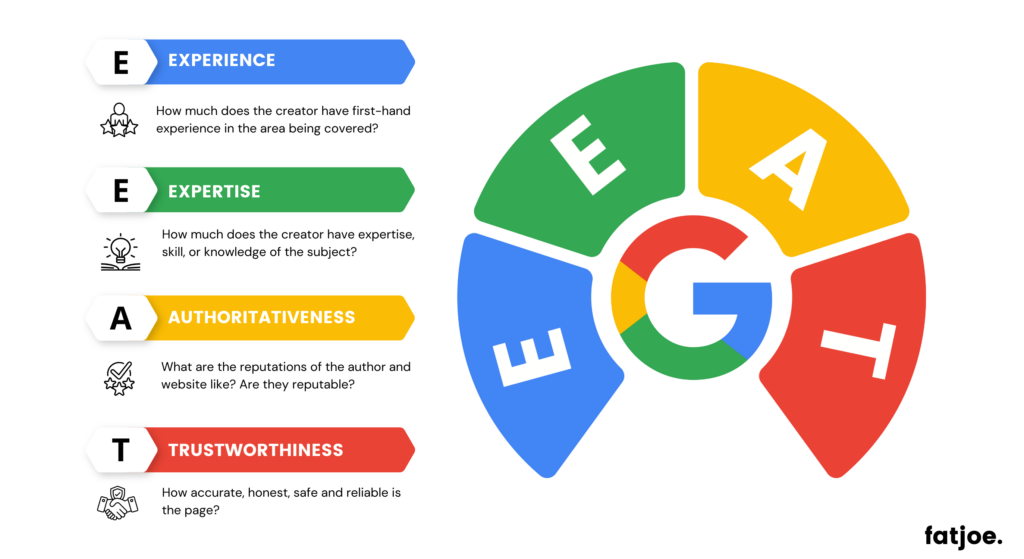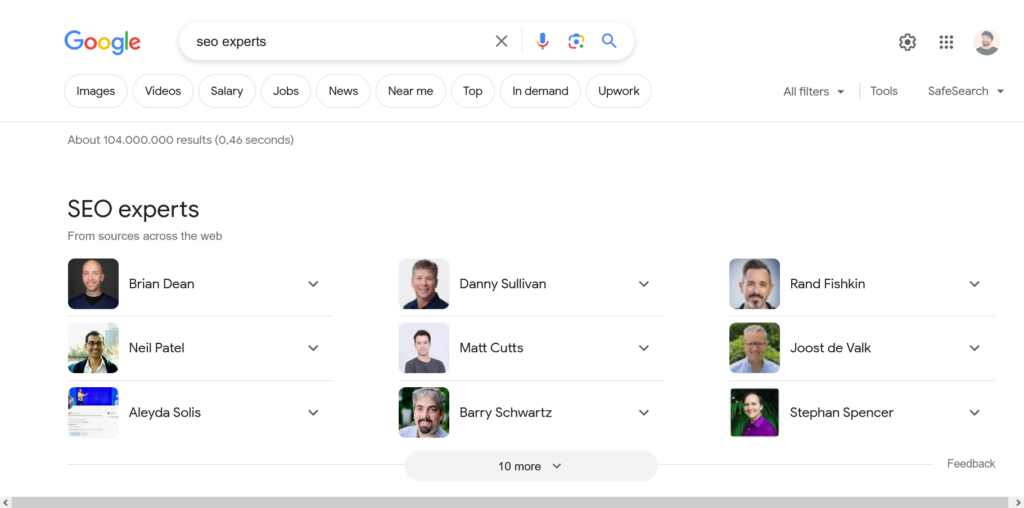Is Topical Authority an SEO Hype or the AI Content Crap Savior?

These days I’m wary of hypes. ChatGPT and AI (Artifical Intelligence) anyone?
It’s rather CrapGPT and Artificial Idiocy. It was the most annoying one in 2023.
Over the year we got inundated with Al powered
- low level content
- fakes
- get rich quick schemes.
“Topical authority” sounds like another overused buzzword in the SEO community to wow peers and clients alike.
On the flip-side the authority of the future will be less dependent on
- domains
- websites
- topics
Instead authority will be more tied to the author itself and whether s/he is
- reliable
- credible
- trustworthy.
Can topical authority even save us all from the wave of crap?
Yes, I mean AI content the Web and search gets flooded with. See below!
Why Journalists Have More Authority than AI
Think of journalists. They often write for multiple publications on a variety of topics.
Even if they cover the topic at hand for the very first time they have more topical authority than AI content. Why?
Usually an SEO content mill uses CrapGPT to create hundreds or thousands of low quality artificial idiocy posts.
Why are journalists new to a subject more authoritative?
- It’s because they have a track record of published stories.
- They also have proof that they are human by editorial oversight.
- They also have a name and history of what they’ve done in the past.
Guess what? Most AI content does not have any of those!
When I was a young man – that was long ago by now – I wanted to be a journalist or writer.
Believe it or not but it was before the Web took off!
I even used a typewriter for a while. Yet around 1995 I became aware of the Web. I was intrigued but too scared to use computers.
I remember PCs before Windows when you had to memorize DOS commands to be even able use them.
Finally in 1997 I was forced to use the Internet in college. We had to set up an email account for the online culture seminar.
The college I was in had ancient computers. We had to use a Unix based e-mail program called Pine.
It was very powerful indeed as long as you memorized the Unix commands.
I couldn’t study journalism so I did American and European Cultural Studies instead. Why?
I was told that you don’t study journalism to become a journalist.
Rather you need to study a subject matter that you then can write about. So you can study medicine, physics or art and then write about those.
Also I was quite fond of reading American literature. Before college I only knew Bukowski and was mainly aware of Hemingway.
Long story short, nowadays it’s more important to know what you write about.
Yet having a proven history of first hand experience is a bigger sign of topical authority.
Why? It’s according to Google’s E-E-A-T principles that measure more than the sheer number of published articles.
Why Does Topical Authority Matter for Google?

What is E-E-A-T all about? Numerous Google, search and other publications explain that already.
You can memorize just this: it’s about
experienced expert authors you trust.
You can be an expert on honey but if you have never tasted it you have no experience.
You can be an author but not an authority to trust. Why? You may write satire e.g.
In 2023 the wildly popular The Onion site got trashed in a HCU or “helpful content update”. Why?
Despite all the link and social media popularity the site does not fulfill Google’s requirements of E-E-A-T. In a way it published fake news.
Google does not accept satire as being trustworthy content.
Popularity and notoriety do not suffice anymore.
You have to be trustworthy to get shown in Google’s top results.
The Onion is nowhere to be found in Google US index even for the most prominent of their homepage stories.
Local news sites you may have never heard of even as an US citizen rank on top of it.
So it’s not just about being a popular author. You have to be a credible authority on both personal and site level.
No, topical authority is not just an SEO hype even though the term gets overused since 2023.
What Does Topical Authority Really Mean?

What is topical authority then? Depending on who uses it it seems to mean something different.
Most SEOs seem to agree that just by flooding the Web with numerous articles on a given topic you become a topical authority on it.
It’s of course not that simplistic. For Google the authority part is even more important than the number of posts or the topic.
Topical authority is most probably about:
- credibility of the source as in publication, not just website or domain
- authority of the author as in the person who writes
- first hand experience and expertise based on real life
- context provided by sources and third party expertise
So topic or topical authority does matter but it’s no magic trick you can use to fool Google.
- The NYT has a high topical authority even on new topics. They could set up a new site on a new domain and they would probably still have that.
- The author who writes the article does not have to be a doctor to write about medicine but it’s better to have that.
- In case an author does not have a doctor in medical science or biology he should at least provide some links and quotes to those who are. Links to actual studies would be best then.
- First hand experience can also mean that a patient writes about all the types of therapies s/he has underwent until s/he finally recovered.
Yet for Google this type of “non-expert” experience is probably meaning less topical authority as they do not want to risk giving the wrong advice.
So topical authority is basically the E-E-A-T concept philosophy + some distilled into one term.
It’s maybe not a metric Google uses but what they measure amounts to topical authority.
Yet it won’t save us all from automated fluff articles. Why? Topical authority still relies too much on particular sites.
So once those decide to automate their non-human artificial idiocy may get too much coverage on Google.
So please just keep your CrapGPT generated articles where they belong – in the trash can.
Many previously reliable publications already experiment with automated content.
They may even create fake news as the editorial oversight is often not scalable enough to keep up with hundreds or thousands of auto-generated articles.
Still – it’s not enough to be human to get a topical authority push IMHO.
The latest “SEO is Ruining the Internet” hatebait by a popular technology tabloid has proven that even human editors sometimes rather support ridiculous claims to get attention than to prove journalistic values or topical authority.
I can just hope that Google steps up the game to demote all kinds of misinformation.
Google’s Danny Sullivan already debunked some of the false claims in that article.
Will the Google search quality raters take concrete steps and flag the culprit?
Until now the hate campaign has proven to be successful at not only generating buzz, engagement but also at earning links and a higher ranking.
With or without AI. there will always be a lot of crap on the Web.
Yet AI content without proper human intervention is more likely to be
- formulaic
- wordy
- and repetitive.
Yes, that’s a sophisticated way top say crappy.
